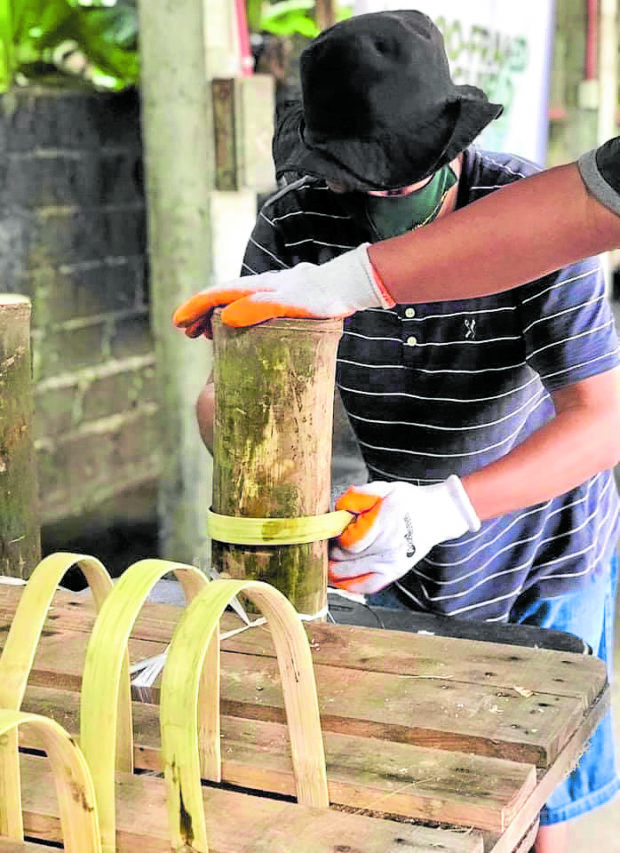Laguna, Cotabato craftsmen find use for bamboo in pandemic fight

HANDCRAFTED A craftsman in Cabuyao City, Laguna, uses a bamboo pole to shape the head frame for handcrafted face shields. —CONTRIBUTED PHOTO
The latest health protocols requiring the use of face shields in public areas have prompted communities in Luzon and Mindanao to step up the production of the protective gear using locally sourced bamboo.
In Laguna province, the Cabuyao City government has adopted the technology developed by the Los Baños-based Forest Products Research and Development Institute (FPRDI), a research unit of the Department of Science and Technology, which uses the common “kawayan tinik” (Bambusa blumeana) for the frame.
It was the same concept replicated by farmers in Cotabato province in Mindanao.The kawayan tinik grows abundantly in Los Baños, Laguna, and in Pililia town and Talim Island in Rizal province.
PPE shortage
At least 300 bamboo-framed and handcrafted face shields have been distributed to front-liners in Cabuyao since Aug. 14.Cesar Austria, the FPRDI project leader, said the idea came up in April in response to the health and economic crises brought about by the coronavirus pandemic.“There was a shortage of PPE [personal protective equipment, that] some hospitals even had to improvise at that time,” Austria said.
The FPRDI applies “steam-bending,” a woodworking technique, to mold the bamboo. The frames are dried and assembled with a nylon rope, which serves as the head band, and polyvinyl chloride (PVC) film.Austria said the PVC film was found to be better than acetate sheets, which are used in the commercially available face shields, since the latter tended to distort the user’s vision.
Article continues after this advertisementThe FPRDI has since produced 2,000 retractable face shields donated to hospitals and barangay checkpoint personnel in Los Baños, Bay and Calamba City. It has shared the technology and provided training to the Cabuyao government.
Article continues after this advertisementBenedict Bueno, Cabuyao information officer, said the program was part of the city government’s economic stimulus for residents, who lost their jobs during the pandemic.
It was also meant to help farmers in a small patch of bamboo plantation in Barangay Casile, he said.
The FPRDI’s design sells for P150 to P200 apiece, a bit expensive than the plastic-framed shields which are sold at P50, but Austria underscored its social and environmental benefits.
Communities can also tweak the process by sun-drying the bamboo instead of using mechanical driers to reduce production cost.
In September, Cabuyao will begin selling the face shields at P100 each to Laguna residents and P150 to those outside the province.
Promotion
In Kidapawan City, Nonoy Jaime, head of the Central Mindanao Green Workers’ Association, said his group, composed mostly of bamboo planters, thought of incorporating the material in face shields to promote the use of bamboo growing in Cotabato.
“Seeing the demand for face shields due to the COVID-19 pandemic, our group decided to start making it, at first, through trial and error,” Jaime told the Inquirer.
With the help of agricultural engineer Junroe Barrios, the group started making the face shields in April at the height of the lockdown.
Jaime said the products were being sold online at P80 apiece. “We have orders from as far as Manila and even from foundations outside the country but the restrictions of mobility due to COVID-19 also hamper our delivery for now,” he said.
Jaime said some hospitals in Kidapawan were already using their face shields.
The group can produce at least 150 face shields a day, but demand has gone up to about 5,000, he said.
While most of them work from home, they needed to establish a formal and orderly manufacturing area for the product, complete with working tables, stripping and sanitary equipment, he added.
Mindanao Development Authority chair, Emmanuel Piñol, sought support for the farmers: “You will be helping this group of farmers survive the current crisis while getting one of the locally made face shields to protect yourself and your family from COVID-19.”
For more news about the novel coronavirus click here.
What you need to know about Coronavirus.
For more information on COVID-19, call the DOH Hotline: (02) 86517800 local 1149/1150.
The Inquirer Foundation supports our healthcare frontliners and is still accepting cash donations to be deposited at Banco de Oro (BDO) current account #007960018860 or donate through PayMaya using this link.